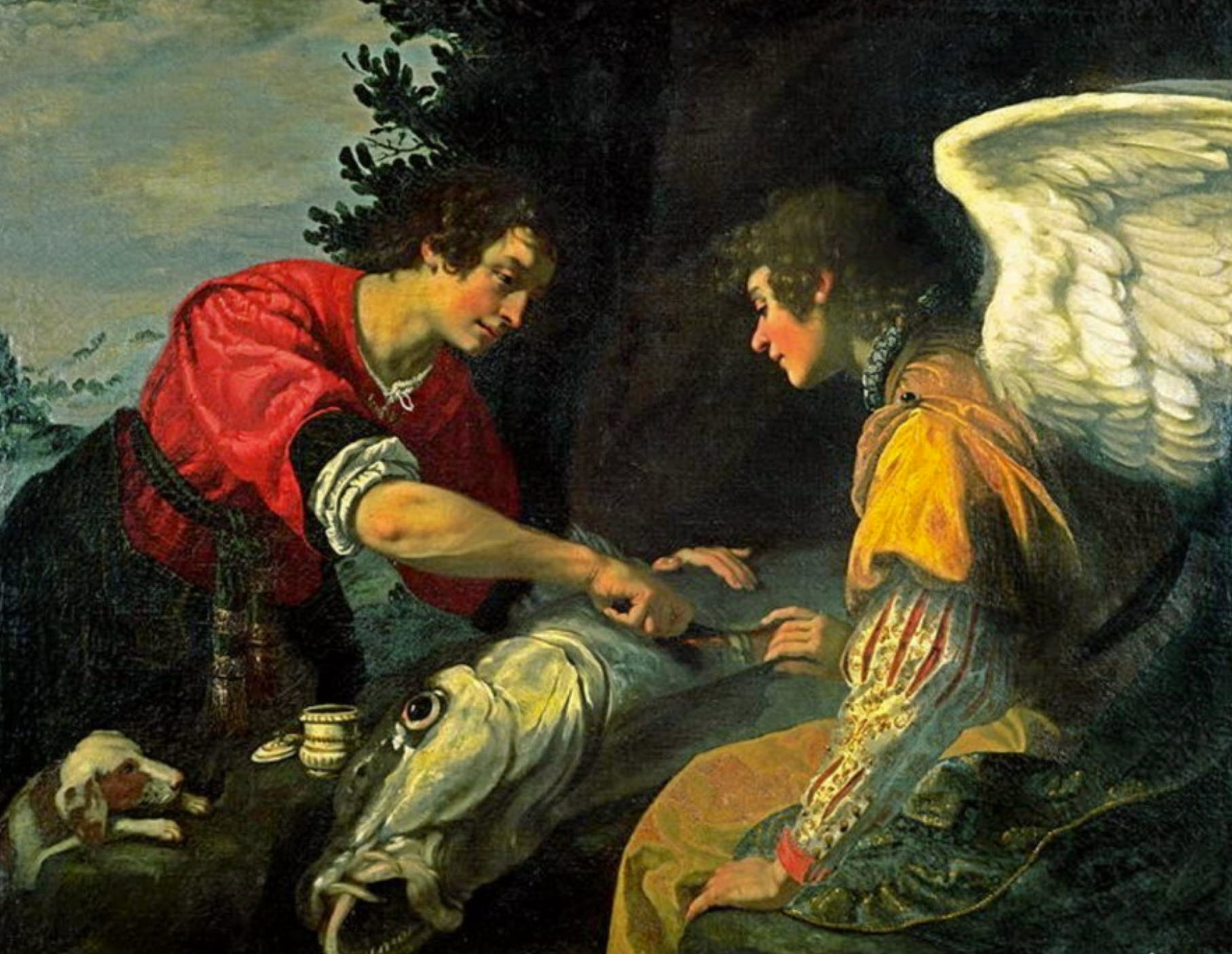The first readings at Mass this week come from the Old Testament Book of Tobit. It tells a rather quaint tale of a devout Jewish family suffering exile in the city of Ninevah in the Assyrian Empire.
Strange things happen in this parable of exemplary people, a veritable Holy Family, long before the family of Nazareth come into view. Here we meet a Joseph-like father, upright, law-abiding, generous, and hospitable, who interrupts the dinner he has planned for poor neighbours to go and bury a fellow Jew who has been strangled in the marketplace and abandoned there. One would think his goodness should be rewarded by God, but like Job, Tobit suffers a silly accident which makes him blind and drives him to despair.

Tobias and the Archangel, Raphael
We then meet the second person in this holy trio, Anna, who has to go to work as a seamstress to support the family. She works so hard, in fact, that she gets a present of a kid goat as a tip from grateful customers. But Tobit’s scrupulous personality gives rise to a self-righteous attack on his longsuffering wife as he accuses her of receiving stolen goods. He mistrusts her and refuses to accept her truth.
He certainly does not follow the advice of a later Jew, Paul, who counsels us “not to use harmful words in talking, but only helpful words, the kind that build up and provide what is needed.” His harsh and unmerited criticism only serves to draw out Anna’s exasperation and frustration, expressed in challenging words about his belief in a just God who is supposed to reward the keepers of the law.
The story goes on to tell of another section of the family, living far away, who are also having a hard time. Raguel, a kinsman, has a daughter called Sarah who has a problem keeping a husband, with seven in a row dying on their wedding night! Although this is said to be the fault of a nasty demon, poor Sarah suffers insults from a maid who echoes the view of society that she is a complete failure in the marriage and children stakes.
Again, the harmful words come into play, leading Sarah firstly to ideas of suicide and then falling back on prayer to God to release her from the pain of this life.
Now the narrative brings together Sarah and Tobit who share the same death wish and a similar prayer. And this leads into what must be a major theme in the book, the role of prayer in Jewish life and God’s response. For the response of God to this pair’s despair is to promise a remedy to each by sending a helpful angel, heavily disguised, to provide a remedy.
The angel Raphael befriends Tobias, the only son/child in this holy family, who has to travel an arduous journey to the house of Raguel and Sarah to collect some much-needed money stored in Raguel’s keeping. But, more important is the arranged marriage between the two young people, inspired, we hear later by the angel.
This is indeed a marriage made in heaven, but if the wedding night goes the way it did in the seven previous suitors it will not augur well for Tobias. But the answer is found in prayer as the couple kneel down and commit their marriage to God. And all is well. We know they will live happily ever after.
It only remains for the happy couple to return home to Ninevah, especially to the joy of Mother Anna (reminding us of Our Lady). But what of blind Tobit, where is his answer to prayer, his remedy? Well, good old Raphael is a healing angel and provides Tobias with an ointment to put on Dad’s eyes, promptly healing him. So prayer is answered, not in the way expected – death – but in healing and new life.
“The family that prays together stays together.”
The whole story is brought together in Saturday’s reading as Raphael comes out as an angel sent by God to test the faith of Tobit and presumably the others. God’s providential plan is worked out through prayer and the intercession of his angel. The life of the believer is revealed in the variety of prayer expressed in the characters, especially Tobit – contrition for sins, petition, praise and especially thanksgiving which is stressed at the end of the tale. This Holy Family has been greatly blessed and they must in turn bless God for his graciousness.
But prayer is not enough, as the angel reminds these faithful ones. An ethical lifestyle is required, the very things Tobit has been doing from day one in fasting and almsgiving.
And so, an unhappy beginning has a happy ending. God may punish his people by leading them into exile for their sins and putting good people to the test. But essentially God is a loving, healing and forgiving God, a God who sends angels to support a Holy Family.
Does it not sound familiar? Just think of a certain Gabriel who will come in God’s good time to form a greater Holy Family, of Jesus, Mary, and Joseph!
Kieran ofm
